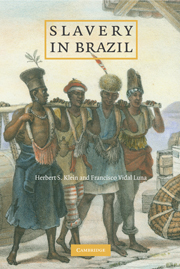Book contents
- Frontmatter
- Contents
- Preface
- I THE POLITICAL ECONOMY OF SLAVE LABOR
- 1 Origins of the African Slavery in Brazil
- 2 The Establishment of African Slavery in Brazil in the Sixteenth and Seventeenth Centuries
- 3 Slavery and the Economy in the Eighteenth Century
- 4 Slavery and the Economy in the Nineteenth Century
- 5 The Economics of Slavery
- II BRAZILIAN SLAVE SOCIETY
- III END OF SLAVERY
- Bibliography
- Index
3 - Slavery and the Economy in the Eighteenth Century
Published online by Cambridge University Press: 05 June 2012
- Frontmatter
- Contents
- Preface
- I THE POLITICAL ECONOMY OF SLAVE LABOR
- 1 Origins of the African Slavery in Brazil
- 2 The Establishment of African Slavery in Brazil in the Sixteenth and Seventeenth Centuries
- 3 Slavery and the Economy in the Eighteenth Century
- 4 Slavery and the Economy in the Nineteenth Century
- 5 The Economics of Slavery
- II BRAZILIAN SLAVE SOCIETY
- III END OF SLAVERY
- Bibliography
- Index
Summary
The growth of the West Indies plantation system in the seventeenth and the early eighteenth centuries did not put an end either to the Brazilian sugar industry or to the thriving slave system upon which the Brazilian economy rested. The Dutch occupation and the subsequent growth of the West Indies sugar industry did, however, seriously affect the colonial economy. Not only was a large part of the Pernambuco sugar industry destroyed, taking a long time to recover, but Brazilian export markets were also reduced and production stagnated for most of the late seventeenth and the early eighteenth centuries. Bahia did continue to grow, but the golden age of profitability had passed. Competition from the West Indies sent sugar prices into a decline relative to the first half of the century, and West Indian demand for slaves meant rising African slave prices, thus squeezing planter profits. By the last two decades of the century, the Brazilian economy was in a relatively depressed state, and an anxious Crown began seeking new markets and products to revive the colonial economy.
Among the many attempts to develop new resources, the Crown began to explore the interior with hopes of finding mineral wealth. The success of the paulista bandeirantes in supplying Indian slaves at mid-century had led to government subsidization of systematic surveys of the interior.
- Type
- Chapter
- Information
- Slavery in Brazil , pp. 35 - 73Publisher: Cambridge University PressPrint publication year: 2009



